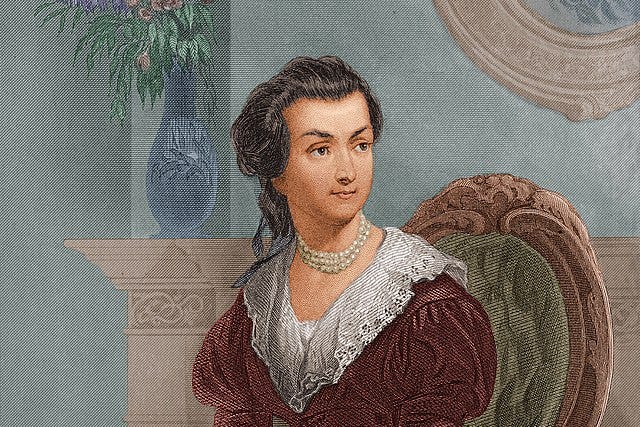In 1779, John Adams was sent to Europe on diplomatic business. His son John Quincy came reluctantly along across the sea, urged on by his mother Abigail. The boy was 12.
John Quincy and his father made their weary way to France from Spain after a leak in the ship derailed their ocean voyage. Abigail’s letters would reach them there, far from their infant homeland, father and son maneuvering through the treacherous dominions of the old world. Abigail knew it was hard.
But in the winter of 1780, she wrote to John Quincy that he would one day thank the chilly stars under which he had been born. “It is not in the still calm of life, or the repose of a pacific station, that great characters are formed,” she insisted. War had torn a gash through the vulnerable days of his youth, and the outlook of his young manhood was no less perilous. Yet “Great necessities call out great virtues,” and “The Habits of a vigorous mind are formed in contending with difficulties.”
Hillsdale’s Kevin Slack brought the letter to my attention, and it lingers in my mind this Independence Day. I confess to a certain sorrow over the lost harmony I remember from childhood, the easy confidence of the United States I moved to at the age of seven. The discontents we live with now must have been brewing then, too. But the way I remember those days, it was common to take it for granted that America would stand unchallenged among the great powers, its triumphs in statecraft and justice unassailable.
There were problems, sure. But our hope for solving them lay in the bones of this country, whose strong foundations had been set down long ago by men like Adams. They were the ones born into years of turmoil and ruin, before success was a foregone conclusion. We were the ones who lived at ease in the house they built.
And now? It’s a task for some other day to run through yet another list of our many national dysfunctions. We all know they are severe and we are all weary of arguing over precisely their nature, where exactly we went wrong. For my part I can’t stop wondering where we go from here. I wish I didn’t have to ask.
But that’s exactly the regret that makes me think of Abigail, steeling her son for greatness. It wasn’t for lack of tenderness that she advised him to make peace with suffering. She considered it her duty to explain forthrightly that the world was often cruel, and she considered it his duty to face it like a man.
She could be our mother, too—mother of a wayward generation wishing it could wriggle out of a truly daunting moment. Those of us who grew up under comparatively sunny skies may have been lulled into the wishful dream that they could last. Abigail knew better. “Great good fortune never stays in one place long among mortals,” wrote Euripides in his Orestes (line 340). One way or another, things fall apart.
And maybe half our pain comes from imagining that it could be otherwise. I know that when I really survey the territory around me—rather than comparing it to some fantasy land where good things come cheap—I start to feel more hopeful. Not because things are actually just fine, but because the hard terrain ahead is the real one, and there is no other world or life than the one we have been given.
Wars and rumors of wars, brother set against brother, riots and murders in the streets: it’s not the kind of world anyone wants to be born into. But through it all, I still believe this country has good bones. “We hold these truths to be self-evident, that all men are created equal, that they are endowed by their Creator with certain unalienable Rights, that among these are Life, Liberty and the pursuit of Happiness.” They were right about that. Not only for a while, or while the good times last, but forever.
You can still build a community, a family, a life around those words. They are still the best vision our clouded eyes can see, the surest signpost toward that distant country where the streets run straight and true.
The promise of liberty did not drop serenely from heaven into a quiet age. It came rolling like a battle cry from amid the wreckage and danger of our broken world. If our landscape looks bleak, well, that is exactly the sort of landscape through which God himself leads his stumbling people. It’s Abigail’s voice I hear this 4th amid the fireworks: take courage, my son. You were born for such a day as this.
Rejoice evermore,
Spencer
Want more? Here’s my book: How to Save the West




